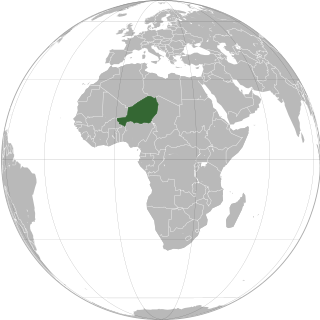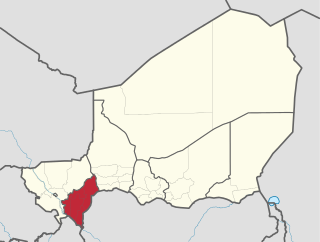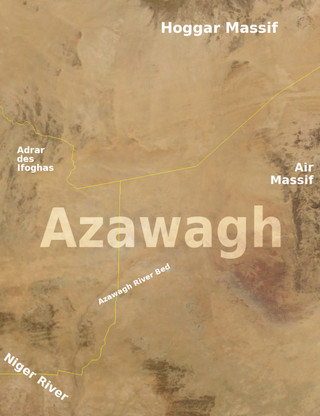Related Research Articles

Niger, officially the Republic of the Niger, is a landlocked country in West Africa. It is a unitary state bordered by Libya to the northeast, Chad to the east, Nigeria to the south, Benin and Burkina Faso to the southwest, Mali to the west, and Algeria to the northwest. It covers a land area of almost 1,270,000 km2 (490,000 sq mi), making it the largest landlocked country in West Africa and the second largest landlocked nation in Africa behind Chad. Over 80% of its land area lies in the Sahara. Its predominantly Muslim population of about 25 million lives mostly in clusters in the south and west of the country. The capital Niamey is located in Niger's southwest corner along the namesake Niger River.

French Sudan was a French colonial territory in the Federation of French West Africa from around 1880 until 1959, when it joined the Mali Federation, and then in 1960, when it became the independent state of Mali. The colony was formally called French Sudan from 1890 until 1899 and then again from 1921 until 1958, and had a variety of different names over the course of its existence. The colony was initially established largely as a military project led by French troops, but in the mid-1890s it came under civilian administration.

The culture of Niger is marked by variation, evidence of the cultural crossroads which French colonialism formed into a unified state from the beginning of the 20th century. What is now Niger was created from four distinct cultural areas in the pre-colonial era: the Djerma dominated Niger River valley in the southwest; the northern periphery of Hausaland, made mostly of those states which had resisted the Sokoto Caliphate, and ranged along the long southern border with Nigeria; the Lake Chad basin and Kaouar in the far east, populated by Kanuri farmers and Toubou pastoralists who had once been part of the Kanem-Bornu Empire; and the Tuareg nomads of the Aïr Mountains and Saharan desert in the vast north. Each of these communities, along with smaller ethnic groups like the pastoral Wodaabe Fula, brought their own cultural traditions to the new state of Niger.

The Songhai people are an ethnolinguistic group in West Africa who speak the various Songhai languages. Their history and lingua franca is linked to the Songhai Empire which dominated the western Sahel in the 15th and 16th century. Predominantly adherents of Islam, the Songhai are primarily located in Niger and Mali. Historically, the term "Songhai" did not denote an ethnic or linguistic identity but referred to the ruling caste of the Songhay Empire known as the Songhaiborai. However, the correct term used to refer to this group of people collectively by the natives is "Ayneha". Although some speakers in Mali have also adopted the name Songhay as an ethnic designation, other Songhay-speaking groups identify themselves by other ethnic terms such as Zarma or Isawaghen. The dialect of Koyraboro Senni spoken in Gao is unintelligible to speakers of the Zarma dialect of Niger, according to at least one report. The Songhay languages are commonly taken to be Nilo-Saharan but this classification remains controversial: Dimmendaal (2008) believes that for now it is best considered an independent language family.

Sudano-Sahelian architecture refers to a range of similar indigenous architectural styles common to the African peoples of the Sahel and Sudanian grassland (geographical) regions of West Africa, south of the Sahara, but north of the fertile forest regions of the coast.

Dosso is one of the eight Regions of Niger. The region has an area of 31,002 square kilometres (11,970 sq mi), with a population of 2,754,500 as of 2020.

Islam in Niger accounts for the vast majority of the nation's religious adherents. The faith is practiced by more than 99.3% of the population, although this figure varies by source and percentage of the population who are classified as Animist. The vast majority of Muslims in Niger are Malikite Sunni. Many of the communities who continue to practice elements of traditional religions do so within a framework of syncretic Islamic belief, making agreed statistics difficult. Islam in Niger, although dating back more than a millennium, gained dominance over traditional religions only in the 19th and early 20th centuries, and has been marked by influences from neighboring societies. Sufi brotherhoods have become the dominant Muslim organization, like much of West Africa. Despite this, a variety of interpretations of Islam coexist—largely in peace—with one another as well as with minorities of other faiths. The government of Niger is secular in law while recognising the importance of Islam to the vast majority of its citizens.

The Zarma people are an ethnic group predominantly found in westernmost Niger. They are also found in significant numbers in the adjacent areas of Nigeria and Benin, along with smaller numbers in Burkina Faso, Ivory Coast, Ghana, Togo, and Sudan. In Niger, the Zarma are often considered by outsiders to be of the same ethnicity as the neighboring Songhaiborai, although the two groups claim differences, having different histories and speaking different dialects. They are sometimes lumped together as the Zarma-Songhay or Songhay-Zarma.
The Dendi was a former province of the Songhai Empire. It survived the fall of the Empire as a kingdom until 1901, when it was conquered by France and incorporated into French West Africa. Its centers today are the cities of Gaya in Niger, Kamba in Nigeria and Malanville in Benin.
Sarraounia Mangou was a chief/priestess of the animist Azna subgroup of the Hausa, who fought French colonial troops of the Voulet–Chanoine Mission at the Battle of Lougou in 1899.

The Azawagh is a dry basin covering what is today the northwestern Niger, as well as parts of northeastern Mali and southern Algeria. The Azawagh is mainly made up of Sahelian and Saharan flatlands and has a population that is predominantly Tuareg, with some Arabic-speaking and Wodaabe minorities and a recent influx of Hausa and Zarma.

The Hausa are a native ethnic group in West Africa. They speak the Hausa language, which is the second most spoken language after Arabic in the Afro-Asiatic language family. The Hausa are a culturally homogeneous people based primarily in the Sahelian and the sparse savanna areas of southern Niger and northern Nigeria respectively, numbering around 86 million people, with significant populations in Benin, Cameroon, Ivory Coast, Chad, Central African Republic, Togo, Ghana, as well as smaller populations in Sudan, Eritrea, Equatorial Guinea, Gabon, Senegal, Gambia. Predominantly Hausa-speaking communities are scattered throughout West Africa and on the traditional Hajj route north and east traversing the Sahara, with an especially large population in and around the town of Agadez. Other Hausa have also moved to large coastal cities in the region such as Lagos, Port Harcourt, Accra, Abidjan, Banjul and Cotonou as well as to parts of North Africa such as Libya over the course of the last 500 years. The Hausa traditionally live in small villages as well as in precolonial towns and cities where they grow crops, raise livestock including cattle as well as engage in trade, both local and long distance across Africa. They speak the Hausa language, an Afro-Asiatic language of the Chadic group. The Hausa aristocracy had historically developed an equestrian based culture. Still a status symbol of the traditional nobility in Hausa society, the horse still features in the Eid day celebrations, known as Ranar Sallah. Daura is the cultural center of the Hausa people. The town predates all the other major Hausa towns in tradition and culture.
The Dosso Kingdom is a precolonial state in what is now southwest Niger which has survived in a ceremonial role to the modern day.

Téra is a department of the Tillabéri Region in Niger. Its capital is the city of Téra. As of 2011, the department had a total population of 579,658 people.

Niger–Nigeria relations refer to the current and historical relationship between Niger and Nigeria, two neighbouring countries in West Africa. Relations are based on a long shared border and common cultural and historical interactions.

Arewa or Arewaland is a Hausa word which means "The North". The term is used to refer to Northern Nigeria general. The terms Arewa and Arewacin Nijeriya are used in Hausa to refer to the historic region geopolitically located north of the River Niger.
The continued use of the term, Arewa ... has conjured up an image among educated Northerners that resonated far beyond the institutional structures Sir Ahmadu Bello created: the successor to the Bornu and Sokoto Caliphate; the vision of God's Empire in the region; the universality of its claim to suzerainty; and in a more prosaic but no less powerful sense, the concept of a polity with an emphasis on unity and sense of shared purpose in northern West Africa beyond the popular slogan--'one North, one People'.

Sarraounia is a 1986 historical drama film written and directed by Med Hondo. It is based on a novel of the same name by Nigerien author Abdoulaye Mamani, who co-wrote the screenplay. The novel and film concern the real-life Battle of Lougou between Azna queen Sarraounia and the advancing French Colonial Forces of the Voulet-Chanoine Mission in 1899. Sarraounia was one of the few African tribal leaders that resisted the advances of French expansionists Paul Voulet and Julien Chanoine. The film won the first prize at the Panafrican Film and Television Festival of Ouagadougou (FESPACO) and was critically well received.

The boubou or grand boubou is a flowing wide-sleeved robe worn across West Africa, and to a lesser extent in North Africa, related to the dashiki suit.

The Songhaiborai are a distinct subgroup within the larger Songhai ethnolinguistic family, residing predominantly in Niger's Songhai region and Northern Mali, with a minority presence in Burkina Faso. Notably, they trace their lineage to the ruling dynasties of the ancient Songhai Empire.

Nigerien nationality law is regulated by the Constitution of Niger, as amended; the Nigerien Nationality Code, and its revisions; and various international agreements to which the country is a signatory. These laws determine who is, or is eligible to be, a national of Niger. The legal means to acquire nationality, formal legal membership in a nation, differ from the domestic relationship of rights and obligations between a national and the nation, known as citizenship. Nationality describes the relationship of an individual to the state under international law, whereas citizenship is the domestic relationship of an individual within the nation. Nigerien nationality is typically obtained under the jus sanguinis, i.e. by birth in Niger or abroad to parents with Nigerien nationality. It can be granted to persons with an affiliation to the country, or to a permanent resident who has lived in the country for a given period of time through naturalization.
References
- ↑ Société Belge d'Études Coloniales (September 1905). "Le Territoire français Niger-Tchad". Bulletin de la Société Belge d'Études Coloniales. 12: 449–523.
- 1 2 3 4 5 Idrissa, Abdourahmane and Samuel Decalo (2012). Historical Dictionary of Niger (4th ed.). Scarecrow Press. p. 588. ISBN 978-0810870901.
- ↑ Trillo, Richard (2008). The Rough Guide to West Africa. Penguin. p. 1360. ISBN 978-1405380706.
- ↑ Thom, Derrick J. (1975). The Niger-Nigeria boundary, 1890-1906: a study of ethnic frontiers and a colonial boundary . Ohio University, Center for International Studies. pp. 42.
- ↑ Bloom, Peter J. (2008). French Colonial Documentary: Mythologies of Humanitarianism . University of Minnesota Press. pp. 265. ISBN 978-0816646289.